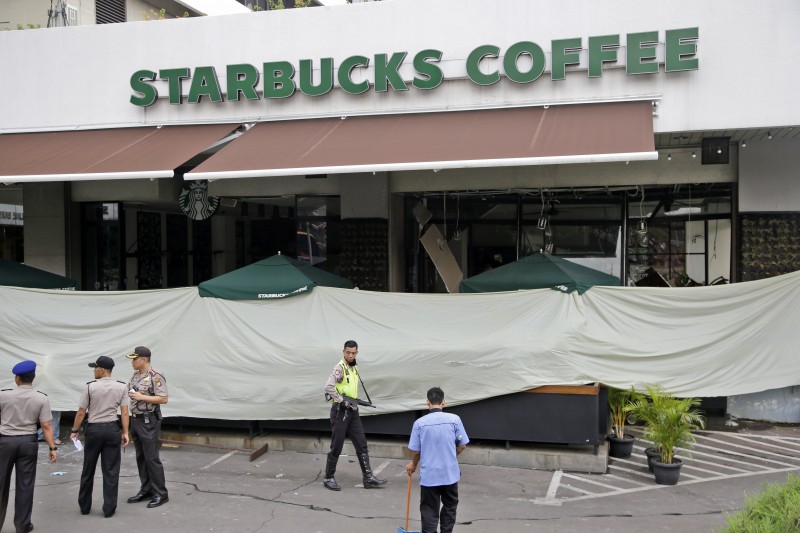Wanted: straightforward talk

Police and officials gather in the parking lot outside the damaged Starbucks cafe where Thursday’s attack occurred in Jakarta, Indonesia, on Friday, Jan. 15, 2016. A day after attackers detonated bombs and engaged in gunbattles with police in the central part of Indonesia’s capital, Jakarta tried to get itself back on track. (AP Photo/Tatan Syuflana)
AN ANONYMOUS text message was blasted out to perhaps millions of Filipinos last Saturday, warning them to stay away from crowded places such as malls, markets, churches, etc. for the meantime due to an alleged confidential report from the Armed Forces of the Philippines that the terrorist group Islamic State (IS)—believed to be responsible for the bomb attack in Jakarta, Indonesia, and a similar attempt in Kuala Lumpur, Malaysia—is targeting the Philippines next. The warning was unverified, the text message added, but better to be safe than sorry, right?
Whoever sent the message might have thought he or she was being prudent and reasonable in warning people; nevertheless, it was still reckless and irresponsible to be spreading rumor without first verifying from the authorities, and thereby possibly causing panic and anxiety among the populace. The country’s law enforcement agencies are on Facebook, Twitter and other social media; ditto the media organizations that could be asked to fact-check the so-called unverified report right away with the concerned government agencies. Instead, as usual in this shoot-from-the-hip country, an anonymous eager-beaver just went ahead and made the decision on his or her own to spook the public about the IS threat.
Article continues after this advertisementThis is not to downplay the very real dangers posed by IS terrorism; certainly, what made the text message more plausible than it needed to be was the seemingly inexorable march of IS bombings from one country to the next over the last several months, appearing to inch closer and closer to Philippine shores. From its stealthy, lightning-fast beginnings in a disintegrating junction of Iraq and Syria and the Middle East, IS has supplanted al-Qaida as the world’s No. 1 terrorist threat by claiming to have set off bombs and killing scores in Libya, Tunisia, Yemen, Egypt, Kuwait, Turkey, Cameroon, Paris and now Jakarta. Malaysia has just announced it arrested two of its citizens and foiled a planned attack similar to the one that locked down a section of the Indonesian capital days ago and killed seven—five attackers and two civilians. The Philippines must be up next, right?
It’s no wild conjecture. Mindanao has been an incubator of Moro rebels for decades, and reports have emerged of IS having reached the Abu Sayyaf and other fringe groups in the region, with some fighters reportedly even shipping off to join the terrorist army in Iraq and Syria. IS’ vow to reestablish a worldwide Islamic caliphate “has attracted 30,000 foreign fighters from around the world, including a few hundred Indonesians and Malaysians,” according to an Associated Press report. Like al-Qaida before it, IS would certainly use the festering landscape of violence, impoverishment and discontent in Muslim Mindanao, so near to both Malaysia and Indonesia, to recruit radicalized Filipino Muslims to its ranks.
It’s a crucial hour for the AFP and the Philippine National Police to demonstrate that they have the wherewithal to keep these looming frightful scenarios in check—to step up their intelligence of local radical groups and disrupt any plans at mass terrorism. Both have officially gone on “full alert status” following the Jakarta attack, with the PNP ordering its units “to elevate target hardening measures on all vital installations” and “continuously launch offensive tactical operations versus threat groups.” But the AFP spokesperson, meanwhile, asked by Interaksyon.com about Jakarta-style threats on the horizon, said: “None monitored so far. Security sector agencies maintain a proactive stance to prevent such incidents.”
Article continues after this advertisementThe aim, perhaps, for the curt, jargon-laden language (“target hardening measures”) is to calm the public, but if the Aquino administration is to fully engage the people in being vigilant of, but not cowed by, terrorism, it must learn to go beyond inert pro-forma pronouncements and begin talking in earnest about the measures it is doing to head off any possibilities of Manila, or any other Philippine city, becoming the next attack target.
Calming a jittery nation vis-à-vis the dangers of terrorism cannot be left to clumsy mouthpieces or badly written press releases. In that vacuum only grows the added menace of rumor, conjecture—and unfounded fear.
















